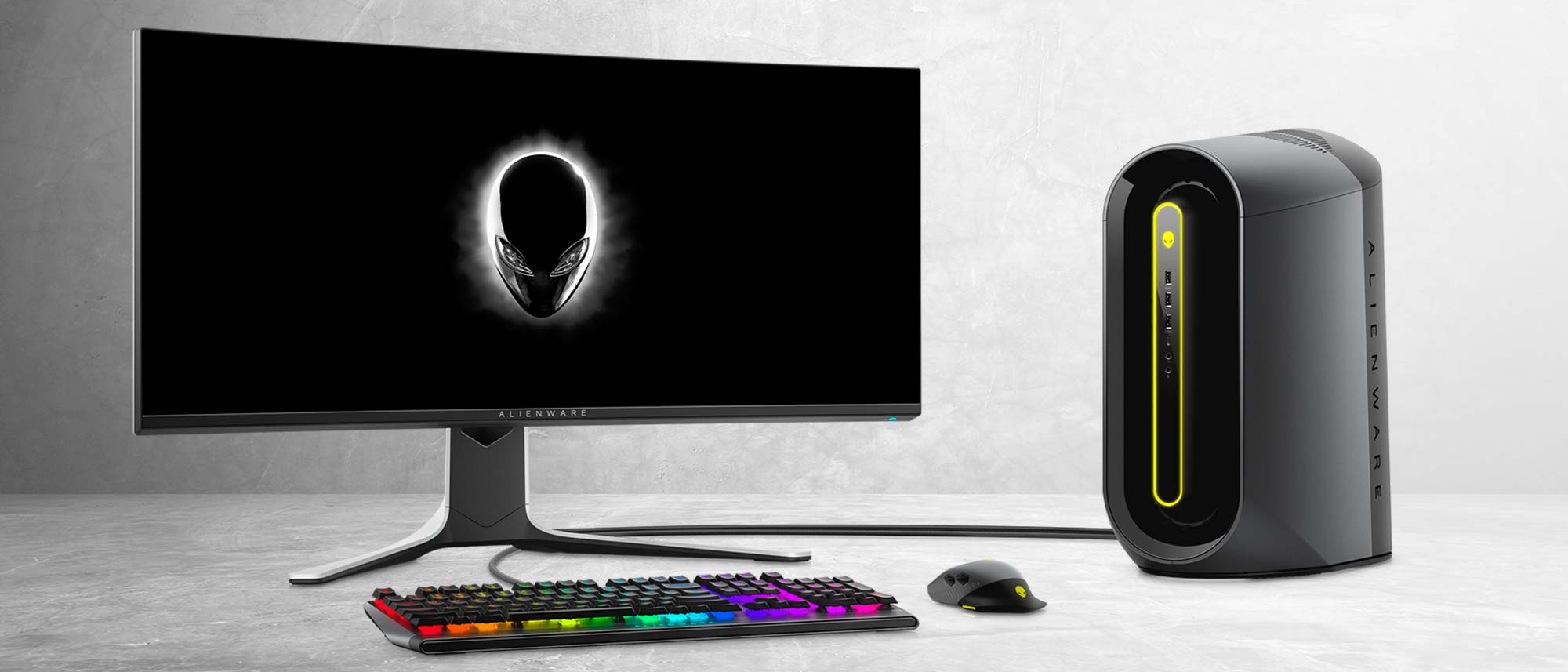Tom's Guide Verdict
The Alienware Aurora Ryzen Edition R10 (2021) has good gaming performance for the price, but its design could be better.
Pros
- +
Good AMD components
- +
Reasonable price
- +
Solid gaming performance
Cons
- -
Very loud
- -
Inconvenient design
- -
So-so software
Why you can trust Tom's Guide
Price: $2,640
Processor: Up to AMD Ryzen 9 5950X
RAM: Up to 128 GB
Graphics Card: AMD Radeon RX 6800 XT
Storage: Up to 2 TB SSD + 2 TB HDD
Accessories: Dell Multi-Media Keyboard, Dell Optical Mouse MS116AW
Ports: USB-A, USB-C, 3.5 mm audio, optical audio, DisplayPort, HDMI
Size: 18.9 x 17.0 x 8.8 inches
Weight: 39 pounds
The Alienware Aurora Ryzen Edition R10 (2021) tells you everything you need to know about the product right in the name. It's an Alienware Aurora gaming rig, which means you're going to get a distinctive chassis, packed full of powerful, customizable hardware. It also tells you that it contains AMD components rather than Intel/Nvidia gear, and that it's based on the slightly older R10 build.
The Aurora Ryzen Edition R10 performs comparably to its Intel/Nvidia counterpart. That means you can run the best PC games at QHD resolutions easily, and in 4K with only mild compromises. Still, there's a general sense that AMD software is harder to navigate than it needs to be, and that means you'll need to spend a lot of time fine-tuning game settings. The problems that exist in the standard R10 and R11 — the loud fans, the odd chassis, the unnecessary Dell software — are still present here.
Still, the Aurora Ryzen Edition R10 offers good performance for a reasonable price, and if you're just getting started in the world of PC gaming, it may be one of the best gaming PCs for your purposes. Read our full Alienware Aurora Ryzen Edition R10 (2021) review to learn more.
Alienware Aurora Ryzen Edition R10 (2021) review: Price and availability
The Alienware Aurora Ryzen Edition R10 (2021) isn't widely available yet (nor does Dell have a hard release date), so it's hard to say what the range of prices may look like. At present, the Ryzen Edition models listed on Alienware's website refer to last year's model, so listing their prices and components wouldn't be especially helpful.
What we can say is that our review unit came with an AMD Ryzen 7 5800X CPU, an AMD RX 6800 XT GPU, 32 GB RAM, 1 TB SSD + 2 TB HDD storage, liquid CPU cooling and a 1000W power supply. This build will retail for $2,640 whenever it's available.
Based on a spec sheet from Dell, users will be able to customize the Alienware Aurora Ryzen Edition R10 with CPUs ranging from an AMD Ryzen 5 3500 to an AMD Ryzen 9 5950X, and GPUs from an AMD Radeon RX 5300 to an AMD Radeon RX 6800 — or Nvidia GeForce RTX 30-series GPUs, if they prefer. For what it's worth, the Intel/Nvidia Alienware models start around $1,200, and range up to $4,000 and beyond.
Alienware Aurora Ryzen Edition R10 (2021) review: Design
In our review of the Alienware Aurora R11, I pointed out that the Aurora PC line has an unconventional design. The Alienware Aurora Ryzen Edition R10 (2021) follows suit. Rather than a plain black box, this PC has an oval chassis, which tapers at the front and widens at the back. It's not quite a rounded rectangle and not quite an oval, but it's an intriguing shape.
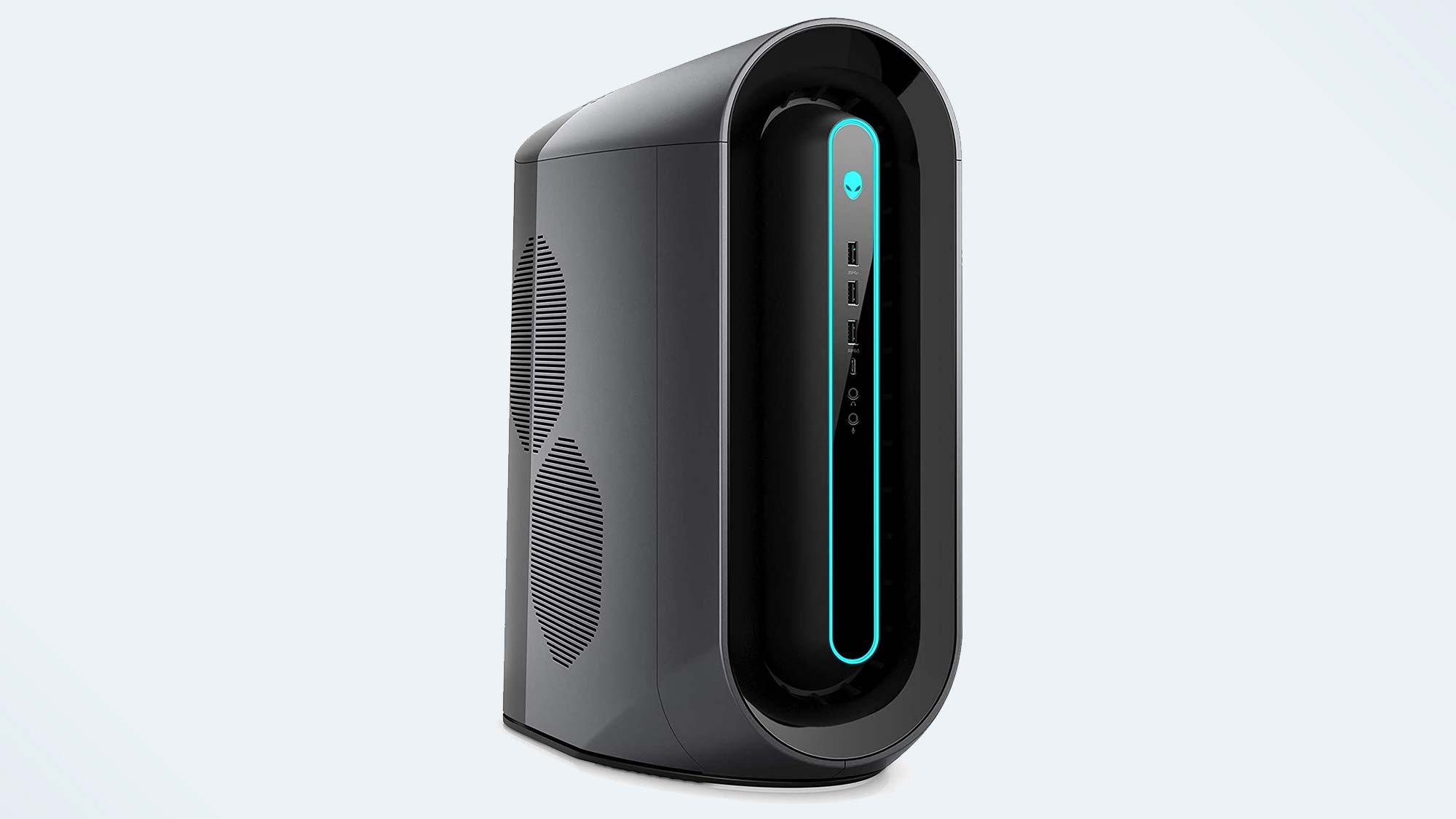
That also means that the Aurora Ryzen Edition R10 is somewhat difficult to place, since it doesn't fit flush against any surfaces. At 18.9 x 17.0 x 8.8 inches and 39 pounds, it's also enormous, and quite heavy. You'll need a sturdy desk to support it — or you can put it on the floor, where you can't really appreciate its unique aesthetics.

I'm of two minds about how the Ryzen Edition R10 looks. I'll take something distinctive over something boring every time, but you have to sacrifice an awful lot of space for hardware that could fit in a much more efficiently shaped chassis.
Alienware Aurora Ryzen Edition R10 (2021) review: Ports and upgradability
The Alienware Aurora Ryzen Edition R10 (2021) is not hurting for ports. On the front, you'll find three USB-A ports, a USB-C port and two 3.5 mm audio ports: one for headphones, and one for a mic.
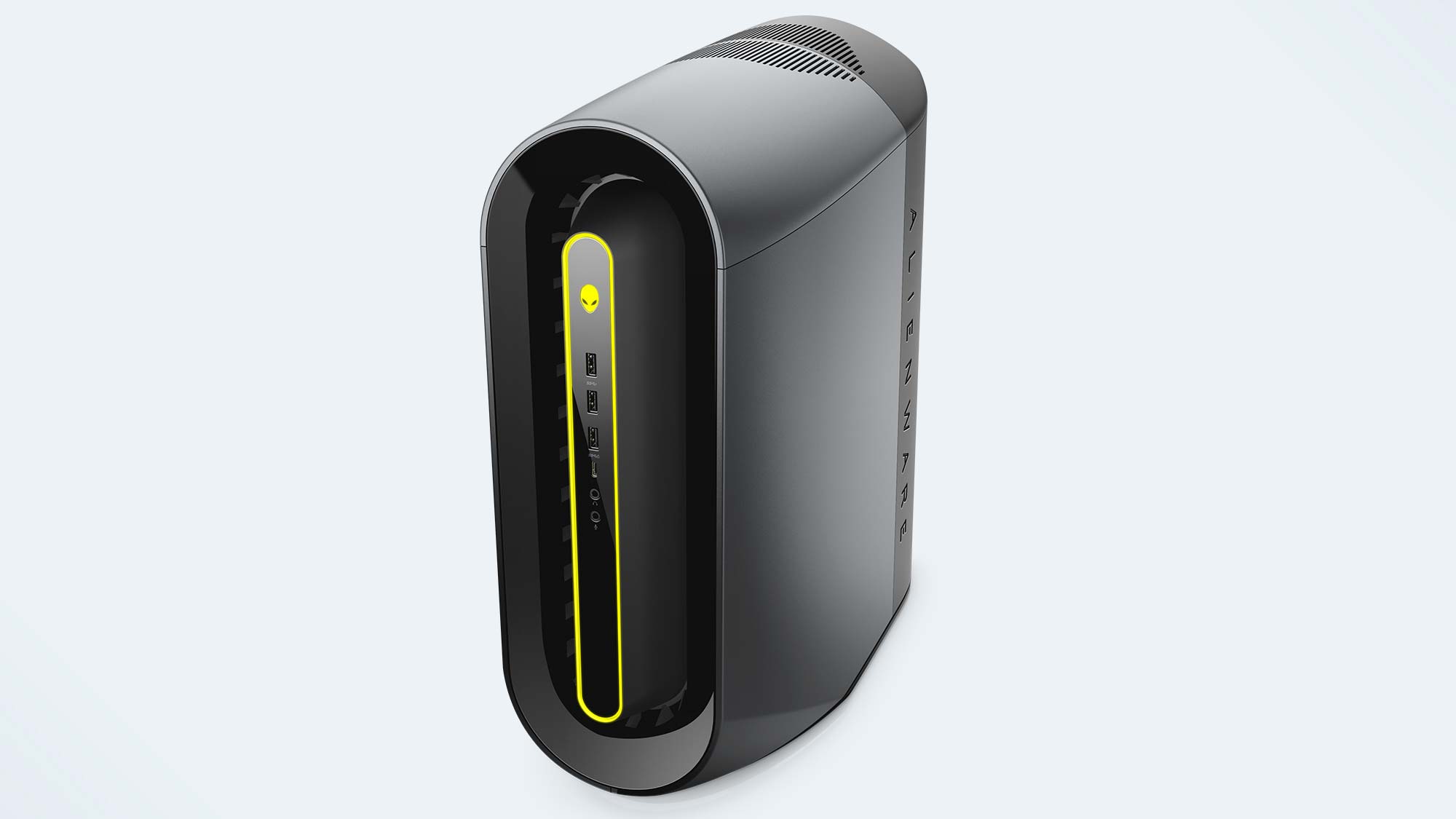
The back panel is even more generous. There, you'll find an optical audio port, 10 USB-A ports, a USB-C port, an Ethernet port, and six different 3.5 mm audio inputs. You'll also get DisplayPorts and HDMI ports, depending on which GPU you get. The 6800 XT offers a USB-C port with display capabilities, two DisplayPorts and one HDMI port.
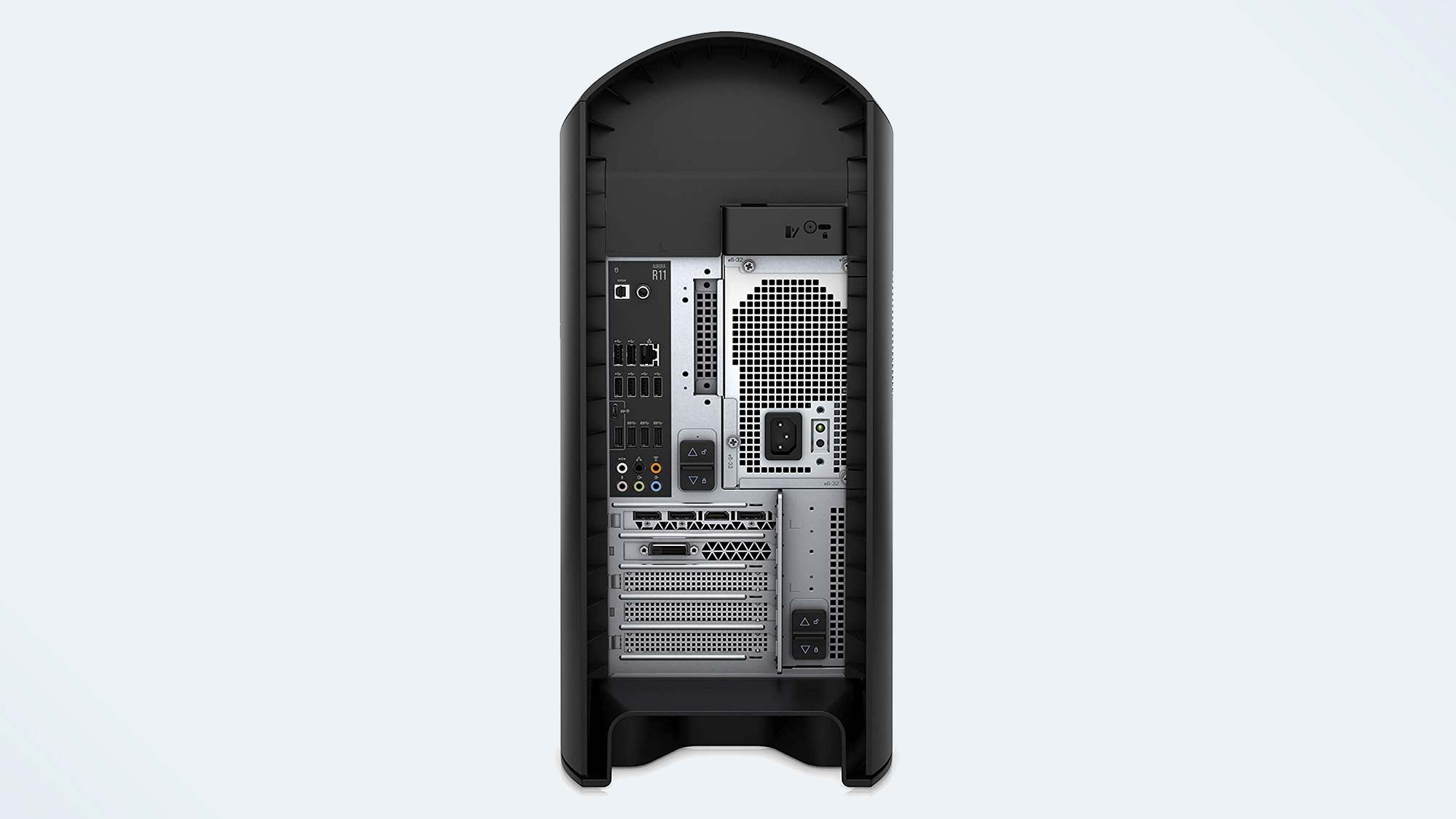
As with the Aurora R11, I feel that the Aurora Ryzen Edition R10 could have offered some more USB-C ports. Many gaming peripherals are starting to transition over, and a good gaming PC like this could easily last for five years or more.
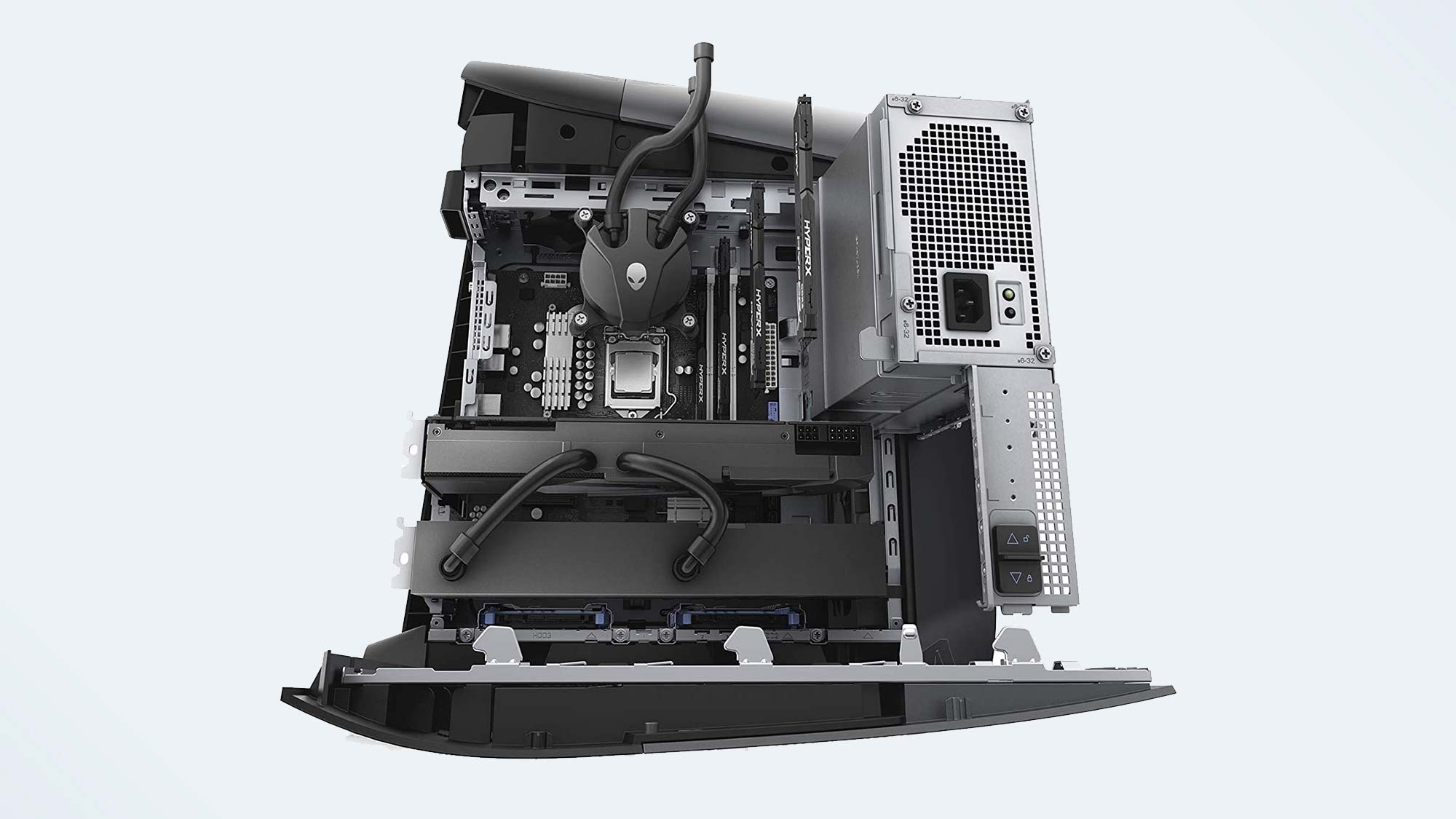
Upgrading the device is also not as seamless as it could be. You can flip two levers on the back and remove the PC's side panel, but the components are all packed in pretty tightly. The curved chassis may also limit what kinds of large hardware you can add. Swapping out the RAM or adding additional storage wouldn't be difficult, though.
Alienware Aurora Ryzen Edition R10 (2021) review: Gaming performance
After using the Alienware Aurora R11 with an Nvidia GeForce RTX 3090 GPU, I knew that the Aurora Ryzen Edition R10 (2021) probably wouldn't offer the same level of performance. (Especially since the Intel/Nvidia model I tested costs about $1,500 more than the Ryzen model.) But I was pleasantly surprised to find that, from a benchmarking perspective, there wasn’t a huge difference between the two systems — and the Ryzen actually did better in a few areas. (This may also be due in part to newer drivers, however.)
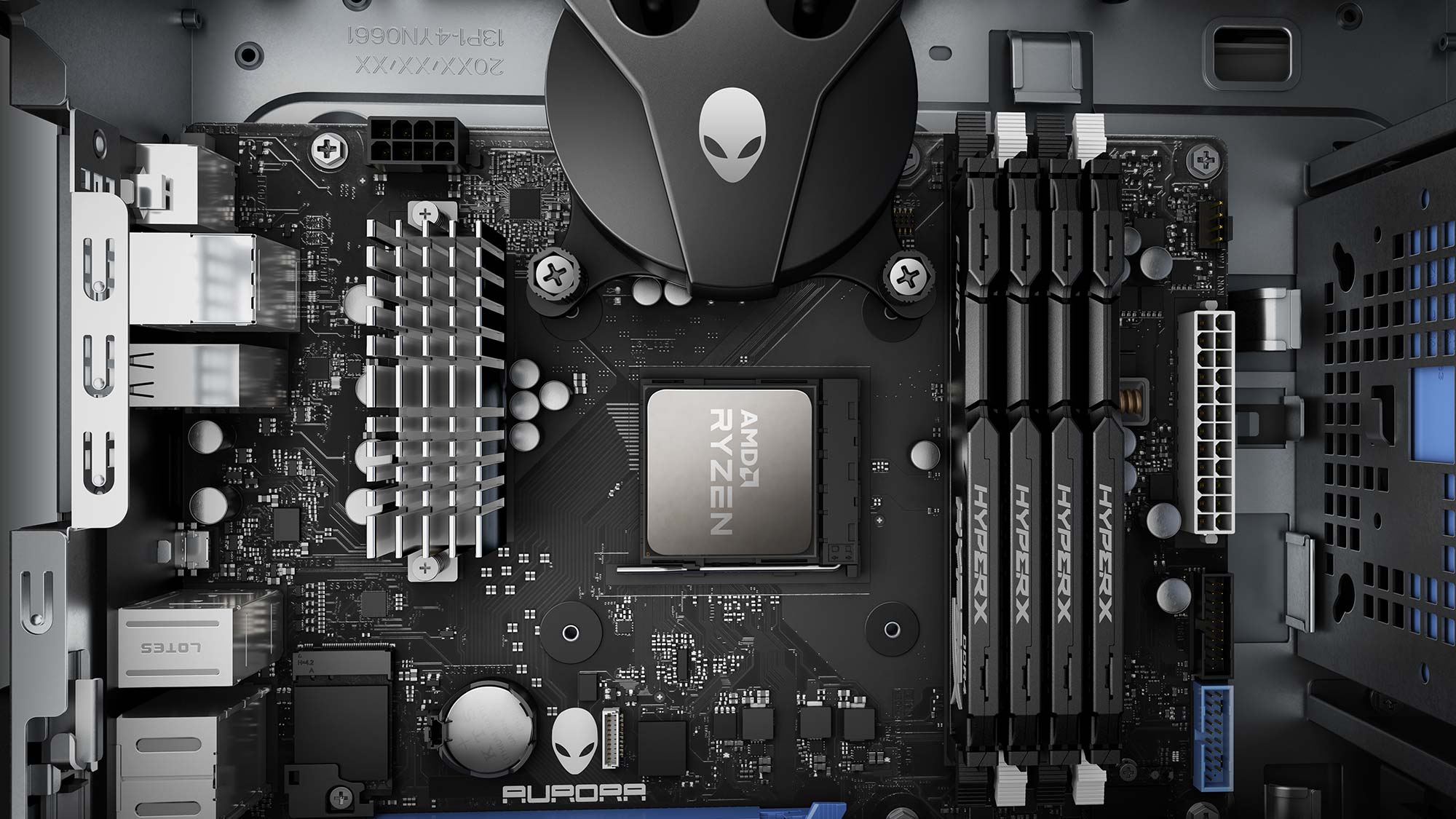
For example: at 1080p resolution, the Aurora Ryzen Edition R10 tackled Assassin's Creed Valhalla at 114 frames per second, Grand Theft Auto V at 145 fps, Red Dead Redemption 2 at 112 fps and Shadow of the Tomb Raider at 128 fps. Compare and contrast to the Aurora R11: Assassin's Creed Valhalla at 87 fps, Grand Theft Auto V at 154 fps, Red Dead Redemption at 107 fps and Shadow of the Tomb Raider at 136 fps.
| Row 0 - Cell 0 | Alienware Aurora Ryzen Edition R10 | Alienware Aurora R11 (RTX 3090) | Corsair One Pro i200 |
| Assassins Creed Valhalla (1080p/4K) | 114/56 | 87/53 | N/A |
| Grand Theft Auto V (1080p/4K) | 145/49 | 154/61 | 126/43 |
| Red Dead Redemption 2 (1080p/4K) | 112/50 | 107/47 | 87/32 |
| Shadow of the Tomb Raider (1080p/4K) | 128/50 | 136/59 | 117/44 |
Consider also the Corsair One Pro i200: It ran Grand Theft Auto V at 126 fps, Red Dead Redemption 2 at 87 fps and Shadow of the Tomb Raider at 117 fps. (We didn't test Assassin's Creed Valhalla with the Corsair.)
The contrast was starker for 4K performance. The Aurora Ryzen Edition R10 scored 56 fps for Assassin's Creed Valhalla, 49 fps for Grand Theft Auto V, 50 fps for Red Dead Redemption 2 and 50 fps for Rise of the Tomb Raider. The Aurora R11 scored 53 fps for Assassin's Creed Valhalla, 61 fps for Grand Theft Auto V, 47 fps for Red Dead Redemption 2 and 59 fps for Shadow of the Tomb Raider. Once again, the Ryzen performed better for Assassin's Creed, but didn't quite measure up on other games.
Once again, the Corsair didn't do as well as either system: 43 fps for Grand Theft Auto V, 32 fps for Red Dead Redemption 2 and 44 fps for Shadow of the Tomb Raider.
Still, these benchmarks can't quite communicate the qualitative difference between the two systems. I tested the Aurora Ryzen Edition R10 with the same suite of games I used on the Aurora R11: Age of Empires III: Definitive Edition, Doom Eternal, Baldur's Gate III and Final Fantasy XIV. In both cases, I used the GPU's proprietary software to optimize games.
First off: Both systems handled some very demanding games at ultra settings. As I tested the two systems on different monitors, I can't directly compare frame rates. But I can say that the Aurora Ryzen Edition R10 had occasional stutters and screen tearing. They didn't happen often enough to ruin any game, but they did happen often enough to be noticeable. Using Vsync alleviated this issue, although it did make the games feel just a little less fluid and seamless.
Alienware Aurora Ryzen Edition R10 (2021) review: Overall performance
Like most gaming PCs, the Alienware Aurora Ryzen Edition R10 (2021) absolutely cannot be fazed by everyday productivity tasks. No matter how many Chrome tabs, video streaming services, music players or chat clients I threw at it — often simultaneously — there was no slowdown or loss of efficiency.
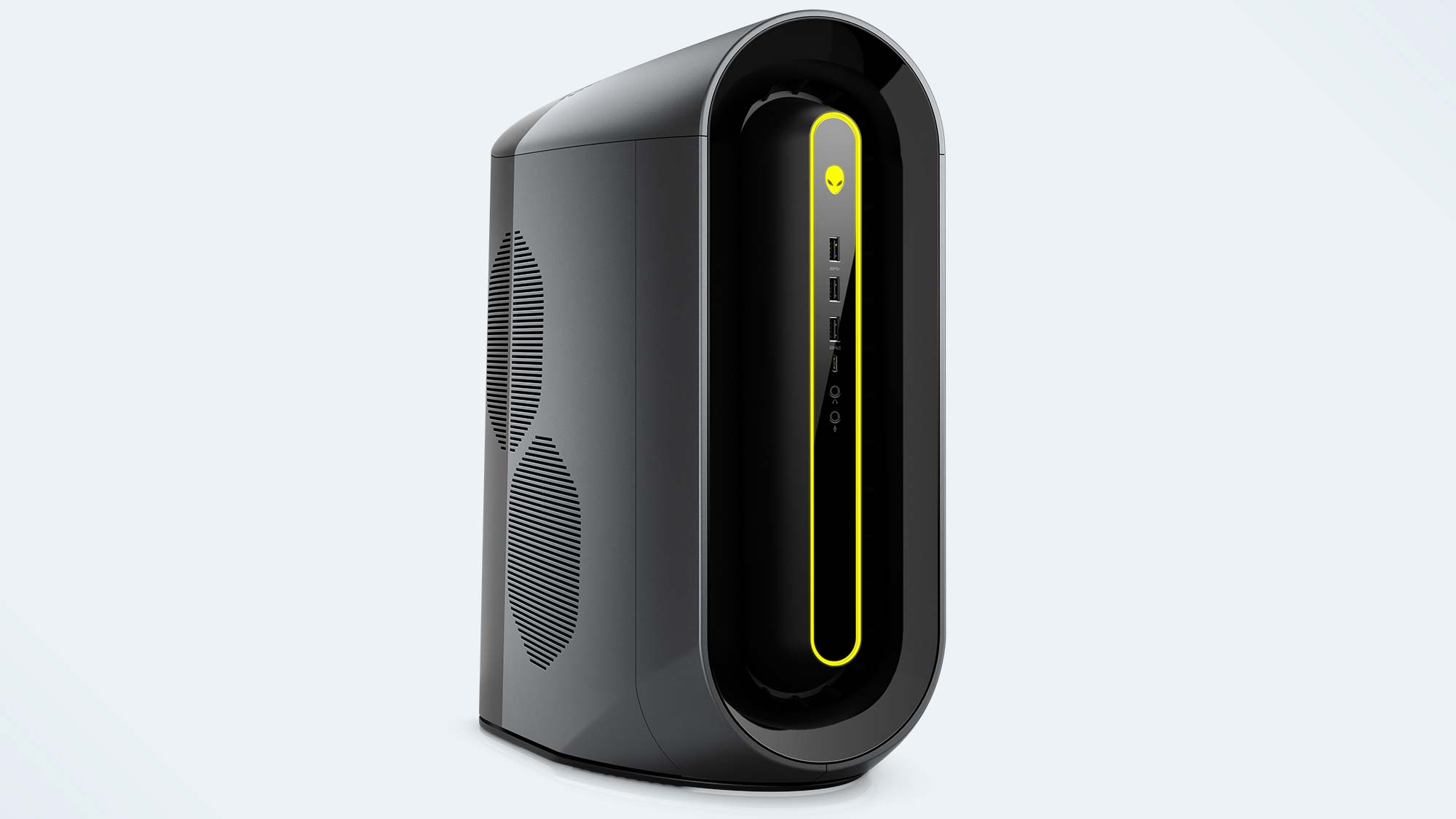
In terms of artificial benchmarks, here's what that looks like. The Alienware Aurora Ryzen Edition scored a 10,035 on the Geekbench 5.3 test, which measures overall system performance. Compare to the Aurora R11's 11,099, and it's not a tremendous difference — although the more expensive system is, unsurprisingly, measurably more powerful overall.
The fan sounds like it could power a small aircraft at first, then settles down to a hum that's merely obnoxious
The Aurora Ryzen Edition R10 also acquitted itself well while copying 25 GB of files from a thumb drive: 42 seconds, or a transfer rate of 638 MBps. The R11, though, did quite a bit better: 22.4 seconds, or a transfer rate of 1191 MBps.
Qualitatively speaking, the Ryzen Edition R10 suffers from the same problem as the R11 and, indeed, most Alienware systems in general: Extremely loud fans. I tended to start up the computer early in the morning, just after I'd woken up, and each time, it scared the living daylights out of me. The fan sounds like it could power a small aircraft at first, then settles down to a hum that's merely obnoxious. You can mitigate this somewhat by selecting a "Quiet" thermal profile in Alienware's proprietary software, although strangely, the core temperature stayed about the same for everyday productivity, regardless of how hard the fan was blowing.
Alienware Aurora Ryzen Edition R10 (2021) review: Software
Like other Alienware machines, the Alienware Aurora Ryzen Edition R10 (2021) doesn't come with much preinstalled software. There are a few brand-specific programs, such as the Alienware Command Center and the Alienware Update (which is much less buggy now than it was a few months ago).
There's not much worth mentioning here, save for the Command Center, which lets you modify the RGB lights on the front of the PC, set up performance profiles for individual games, and modify power and overclocking options.
One piece of non-Alienware software that I do have to discuss, though, is the AMD Radeon Software. Unlike the sleek, streamlined Nvidia GeForce Experience software, the AMD Radeon Software is an unwieldy package, with a busy interface, arcane optimization options, unclear instructions and a wildly inconsistent implementation of the "back" button.
While I appreciate just how granular the software options can get (it can auto-tune your GPU and fan clock speeds per game, if you want it to), a "set it and forget it" mode would have gone a long way here. I also found that the "optimal settings" for various games were not quite as optimal as advertised, necessitating a lot of manual tweaking on my part. (If AMD is reading this review, I assure you that the 6800 XT can run Doom Eternal at a resolution greater than 640 x 480.)
Alienware Aurora Ryzen Edition R10 (2021) review: Verdict
While the Alienware Aurora Ryzen Edition R10 (2021) frustrated me occasionally, overall, I was pleased with its performance. It's not quite as seamless or as powerful as the Alienware Aurora R11, but it's also not nearly as expensive, depending on your configuration. Offering AMD hardware lets users customize a model that best suits their needs, and whatever else you can say about the chassis, it's not like anything else on the market.
The Aurora Ryzen Edition R10 isn't the last word in gaming PCs, but it's well worth considering, particularly if you have a moderate budget and an affinity for AMD hardware. Besides, with the GPU market being what it is, buying a pre-built machine like this may be the only way you can get the exact components that you want for a while.
Marshall Honorof is a senior editor for Tom's Guide, overseeing the site's coverage of gaming hardware and software. He comes from a science writing background, having studied paleomammalogy, biological anthropology, and the history of science and technology. After hours, you can find him practicing taekwondo or doing deep dives on classic sci-fi.
